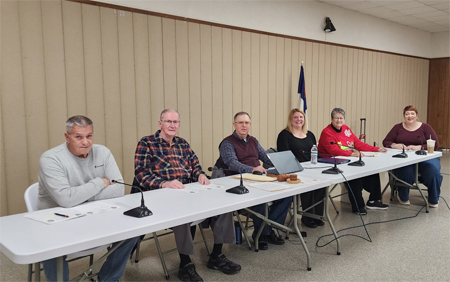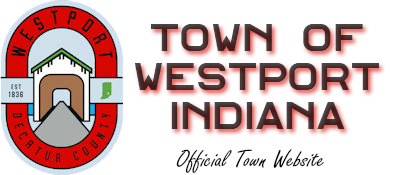Town Council
 The Town Council meets every second Monday of each month at the Westport Community Building at 6:30 p.m. The historic Westport Community Building is located at 205 W Main St.
The Town Council meets every second Monday of each month at the Westport Community Building at 6:30 p.m. The historic Westport Community Building is located at 205 W Main St.
Town Council President – Bryan Gatewood
Vice President – Glenn Black
Council Member- Russell Wilson
Council Member – Dolores Honeycutt
Council Member – Jennifer Hryb
Secretary – Gloria Alumbaugh
The Town Council
Towns are governed by the town council, which exercises the legislative function of the town, and in many towns, acts as the de facto town executive, although by statutory definition, the town council president is the town executive (IC 36-1-2-5(4)). The size of the council, as discussed above, is left largely to local discretion and can range from three to seven members (IC 36-5-2-4.2 and 36-5-1-10.1). There is no limitation of the number of terms a town council member may serve. Also as discussed earlier, a town council may consist of members entirely elected from districts, entirely elected at large, or through a combination of both, as determined by an ordinance passed by the town council (IC 36-5-2-5). Towns under 3,500 in population may abolish district lines and elect all council members at large (IC 36-5-2-4.1).
Towns may also opt to stagger the terms of their town council members in order to prevent the turnover of an entire town council after an election (IC 36-5-2-4.5). During the year preceding a municipal election, a town may adopt an ordinance changing the time municipal elections are held for the offices of: (i) town council members; (ii) clerk-treasurer; and (iii) and judge (IC 3-10-7-2.9). The ordinance must provide all the following:
- the years in which town elections shall be held;
- that the elections for town offices shall be held during general elections or municipal elections, or both;
- a town election may not be held in a year following a presidential election year;
- which town officers are to be elected in each of the years of the town election cycle;
- the ordinance must provide that at least two (2) town officers shall be elected in each year of the town election cycle;
- the ordinance may provide for all town officers to be elected at the same election;
- that the term of office of each town officer elected in the first election cycle after adoption of the ordinance. A term of office may not exceed four years;
- that the term of office of each town officer elected after the first election cycle after adoption of the ordinance is four years; and
- that the term of office of each town officer begins on January 1 after the election.
An ordinance changing the timing of the town election or an ordinance repealing that ordinance previously takes effect when the ordinance is filed with the circuit court clerk of the county in which the largest percentage of the population of the town is located (IC 3-10-7-2.9).
The salaries of council members are set by ordinance, as are all salaries and wages of town officials and employees (IC 36-5-3-2). The council chooses from its members a president who conducts meetings, performs various other specified executive functions, and is designated as the town executive (IC 36-5-2-7). The president’s term is fixed by the members, but it cannot exceed the term of office for the council member. Council members must reside in the town and forfeit their office if town residency is not maintained. Council members elected from a district forfeit office if they cease to be residents of the district.
Occasionally, the town council adopts the practice of dividing departmental responsibilities among its members so that each exercises some supervision over a specific department. The division of responsibility should be spelled out in an ordinance. Even if provided for by ordinance, an individual council member has limited ability to bind or commit the full council.
The general powers of the council are governed by state laws, the methods through which the powers are exercised are left largely to the council to determine by ordinance. The powers of the town council are, in most cases, those powers given to the town government generally (see Chapter 1, Structure and Powers of Municipal Government).
The town’s appointed officials may be numerous if the council has chosen to create, by ordinance, any of the various boards, commissions and authorities authorized by statute, but usually the major appointments are the town marshal and town attorney.
The town council president is the town executive (IC 36-1-2-5(4)), and although the general statutes governing towns do not grant any specific executive authority to the town council president, some statutes governing municipalities give the municipal “executive” ( town council president) certain powers or responsibilities, which would be exercised by the town council president.
